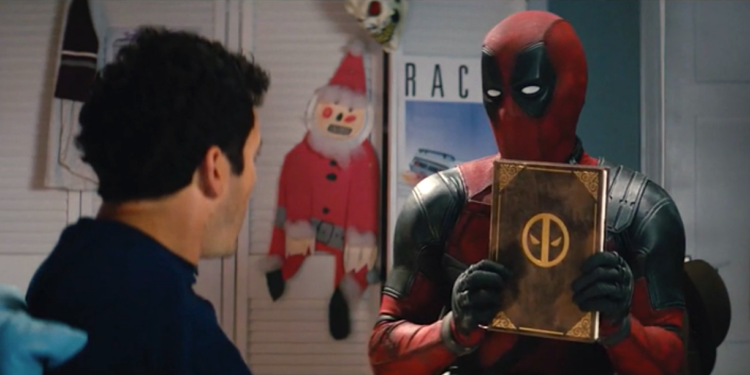
On December 12, Deadpool 2 will hit theaters again. The film’s original release date was May 18, and since then it’s grossed more than $700 million worldwide, making it the seventh highest grossing film of 2018 so far. The version hitting theaters on December 12 isn’t that wildly successful R-rated film though.
Rather, it’s a brand new PG-13 cut called Once Upon a Deadpool. All reporting leading up to the release confirms that it’s essentially the same film, but toned down to meet the standards of a PG-13 rating. A few new scenes were filmed, and there’s now a framing device with Deadpool (Ryan Reynolds) telling the “story” of Deadpool 2 to Fred Savage in a parody of The Princess Bride, but that’s it.
Releasing different cuts of a movie isn’t exactly a new practice. Director’s cuts on DVD releases are commonplace, and there are plenty of stories about certain creative visions being changed in order to secure a more “audience-friendly” rating from the MPAA. But what Fox is doing with Deadpool 2 feels different in an important way. This isn’t the case of a director’s vision being hampered by studio interference, so a Director’s Cut is the only way to see the definitive, intended vision. This isn’t an attempt to make a franchise or property successful after an abysmal original release. Rather, this is the melding of movies and business into one, in a way that’s rather troubling.
There’s a lot at play here, but Once Upon a Deadpool exists for two main reasons: 1. It can make even more money by not only appealing to a younger audience, but also through repeat viewer ticket sales, and 2. Disney is purchasing 21st Century Fox, and that means some of the edgier content at Fox needs to be rolled into the family-oriented entertainment of Disney. You could really label both points “capitalism” in big, bold letters, and you’d be right. Once Upon a Deadpool exists because of market forces, because there’s money to be made, and because corporate interest during a sale rules above all else.
Look, the movie industry is a business, and I’m not here to tell you that it isn’t. But there’s something seriously off-putting about Once Upon a Deadpool and what it tells us about not only the movie business, but about modern day franchises and Intellectual Property, specifically when it comes to superhero films. When a film can be recut for the sole purpose of making more money, what are we losing, and what precedent is being set? “It’s just Deadpool 2, lighten up,” some might say, and maybe they’re right. Maybe the re-release is harmless entertainment aimed at people who want more Deadpool any way they can get it; and it’s not all bad news, as Ryan Reynolds only agreed to the reshoots if $1 from every ticket sale was donated to the Fuck Cancer charity. But just because a film aims for “fun” or is self-aware enough to poke fun at its problems doesn’t mean it can’t tell us something about a troubling pattern in the industry.
Your thoughts on the very existence of Once Upon a Deadpool probably depend on how you feel art and money should interact. Large-scale filmmaking isn’t really possible without financial investment, without a doubt, but does our understanding of a film and its purpose change when the money dictates the content too much? In other words, does something like Once Upon a Deadpool cheapen filmmaking in general? When you begin to treat something like a factory, where every little move is controlled by a corporate overlord with the sole intention of increasing their bottom line, what you get is art that looks and feels like it was made in a factory, devoid of all personality.
To be fair, this isn’t just an issue with Once Upon a Deadpool; this is an issue with superhero films in general, and specifically Marvel properties. They’ve been rebooted and sequelled endlessly, and while they’re financial successes, they don’t carry a lot of personality. With the rare exception—a handful of scenes here, one or two films there—they’re flat experiences. They all boast the same look, the same narrative structure, and the same trick of peddling nostalgia. We’re supposed to simply be happy that these characters exist together on screen, never mind things like story or drama.
It’s difficult to see Once Upon a Deadpool as anything but another step to studios snatching up every bit of Intellectual Property they can, and then folding it into a homogenous idea of what their “brand” is before shipping it out to the public. I mean, the teaser for the film even lays out its corporate greed, but because it’s done with a knowing wink like everything else in the Deadpool films, it’s “funny” and “sarcastic” rather than ridiculously sad.
https://www.youtube.com/watch?v=rEQCvUwS2hY
It’s not enough for us to be breathlessly adoring of every new superhero movie that hits our screen while looking and feeling exactly like the last one. Now we have to literally watch the same movie in new packaging.


Grok Nation Comment Policy
We welcome thoughtful, grokky comments—keep your negativity and spam to yourself. Please read our Comment Policy before commenting.